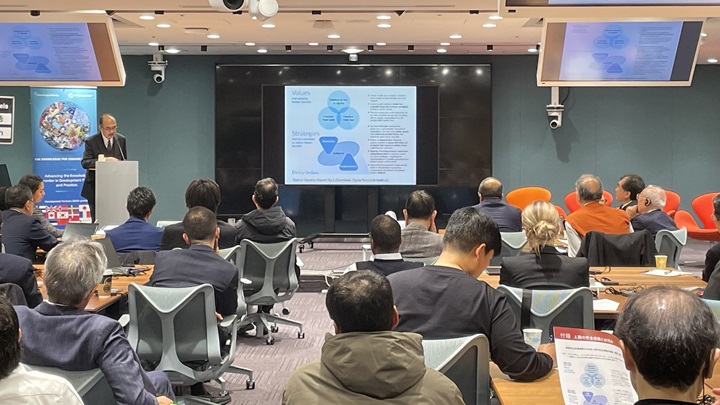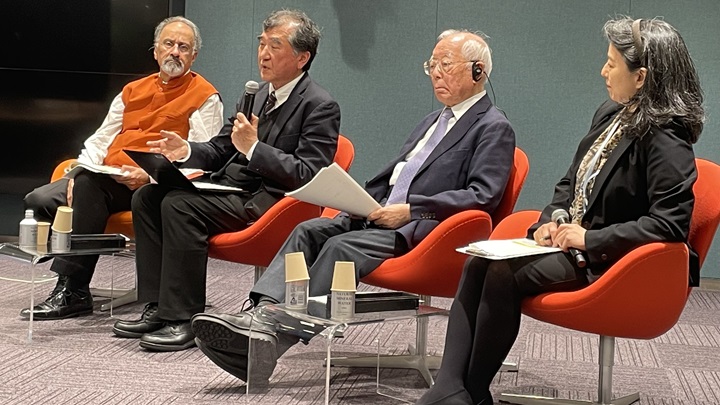From Uncertainty to Risk: A Seminar with the World Bank Explores Strategies for Resilience
2025.05.01
On April 3, 2025, the World Bank Group and the JICA Ogata Sadako Research Institute for Peace and Development (JICA Ogata Research Institute) co-hosted a seminar titled “Rethinking Resilience: How Policies Can Help People to Prepare, Recover, and Adapt.” The World Bank Development Economics (DEC) Vice Presidency’s research program on resilience presented fresh insights into disaster risk management and climate resilience, highlighting people as agents of change who can effectively cope with risks when equipped with higher income, information, insurance, and so on.
Following an overview presented by Indermit Gill, Chief Economist and Senior Vice President, World Bank Group, Mine Yoichi , Executive Director, JICA Ogata Research Institute, reflected on how the themes of resilience resonate with Japan’s development philosophy of human security.

Executive Director Mine Yoichi of the JICA Ogata Research Institute reflects on human security and resilience.
Touching on the works of Ogata Sadako and Nobel Laureate Amartya Sen, Mine emphasized that human security protects people from a wide range of risks—conflict, disaster, disease, and economic crises—while also empowering individuals and communities to recover and thrive. Human security seeks to safeguard people through protection, empowerment, and solidarity. Resilience is the dynamic capability that allows people and communities to rebound from setbacks. While human security centers on individuals, resilience often focuses on the wider community. Together, these concepts are the complementary pillars of a safer, more sustainable world. Mine closed his remarks by expressing appreciation for the World Bank’s intellectual leadership.
In the panel discussion that followed, Nishikawa Satoru, JICA Senior Advisor and Professor, Tohoku University, emphasized that the public can serve as active agents in disaster recovery efforts, emphasizing the importance of having a long-term and short-term view, a bird's eye view and an ant's eye view. He referenced a resilience-building program launched after the 2015 Nepal earthquake, which drew on Japan’s rural development experience from the 1950s. By empowering women and the elderly through nutrition and livelihood support, such as backyard farming and goat herding, that initiative strengthened community resilience from the ground up. He underscored that local people are not powerless, they are capable of action when provided with the information and means to better their lives.

Nishikawa Satoru, JICA Senior Advisor and Professor, Tohoku University (second from left)
To watch the recording of the event, click the link below.

事業事前評価表(地球規模課題対応国際科学技術協力(SATREPS)).国際協力機構 地球環境部 . 防災第一チーム. 1.案件名.国 名: フィリピン共和国.

事業事前評価表(地球規模課題対応国際科学技術協力(SATREPS)).国際協力機構 地球環境部 . 防災第一チーム. 1.案件名.国 名: フィリピン共和国.

事業事前評価表(地球規模課題対応国際科学技術協力(SATREPS)).国際協力機構 地球環境部 . 防災第一チーム. 1.案件名.国 名: フィリピン共和国.

事業事前評価表(地球規模課題対応国際科学技術協力(SATREPS)).国際協力機構 地球環境部 . 防災第一チーム. 1.案件名.国 名: フィリピン共和国.

事業事前評価表(地球規模課題対応国際科学技術協力(SATREPS)).国際協力機構 地球環境部 . 防災第一チーム. 1.案件名.国 名: フィリピン共和国.